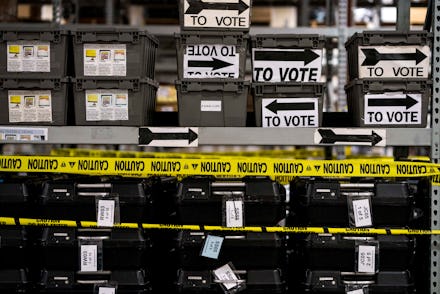The brands have finally decided Georgia's voter suppression law is bad

It's been a week since Republican Gov. Brian Kemp signed an astonishingly brazen slate of voter suppression rules in Georgia into law, following a coordinated push from state Republicans to lock down future elections in the wake of losing both Senate seats and the presidency to Democrats in 2020.
Despite unambiguous warnings that the law amounted to a "Christmas tree of goodies for voter suppression" that is "flagrantly racist" and "a slap in the face to Georgia’s civil rights legacy," two of the state's titans of industry were conspicuously silent in the lead up to the bill's passage. In fact, it's only now that GOP efforts to tighten their hold on state politics by largely targeting voters of color have been codified into law that the CEOs of Delta Airlines and Coca-Cola have chosen to speak out against the new rules.
"I need to make it crystal clear that the final bill is unacceptable and does not match Delta's values," Delta CEO Ed Bastian wrote in a memo circulated throughout the company, which is headquartered in Atlanta, on Wednesday. "The right to vote is sacred. It is fundamental to our democracy and those rights not only need to be protected, but easily facilitated in a safe and secure manner."
"The entire rationale for this bill was based on a lie: that there was widespread voter fraud in Georgia in the 2020 elections," Bastian continued in the message. "This is simply not true."
Coca-Cola CEO James Quincey was similarly incensed, if equally tardy, in his response to the law. "I want to be crystal clear," Quincey wrote in a statement. "The Coca-Cola Company does not support this legislation, as it makes it harder for people to vote, not easier."
While it's nice to see both statements clearly and enthusiastically denounce the GOP's overt effort to suppress votes, it's hard to see either company as doing anything other than offering lip service that's ultimately too little, too late.
In Bastian's case, the belated response reportedly came only after speaking with former American Express CEO Kenneth Chenault, who had helped coordinate an open letter from Black executives calling for companies to push back against the law.
"After having time to now fully understand all that is in the bill, coupled with discussions with leaders and employees in the Black community, it's evident that the bill includes provisions that will make it harder for many underrepresented voters, particularly Black voters, to exercise their constitutional right to elect their representatives," Bastian wrote in his memo, adding, "That is wrong."
That it took nearly a week after the bill was signed into law — and several weeks since it was introduced to the state legislature as a near-sure thing — for Bastian to reach the same conclusion many had reached well before is in-and-of-itself an embarrassing admission. (And his claim that Delta and "other major Atlanta corporations [worked] closely with elected officials from both parties, to try and remove some of the most egregious measures from the bill" is pathetically vague.) But equally troubling is the fact that statements like these from Delta and Coca-Cola will ultimately have little effect beyond simply calling attention to what is effectively (at least, pending court challenges) a done deal. No matter how harshly worded the company's recriminations are, they're meaningless without any concrete action behind them.
In fact, thus far, the only response to Delta and Coke's statements have been from the reactionary right, who have actively worked to punish the airline through punitive legislation, or threatened mass boycotts of the iconic soft drink in lieu of something more to the liking of "patriots."
Here then, is a mess entirely of both companies' own makings. Not only are they being attacked for condemning the bill, but their own condemnations – if the companies really believe what they're saying in the first place — are largely ineffectual to begin with. It's all pain, no gain. Meanwhile, there are multiple lawsuits pending against Georgia's voter suppression law.